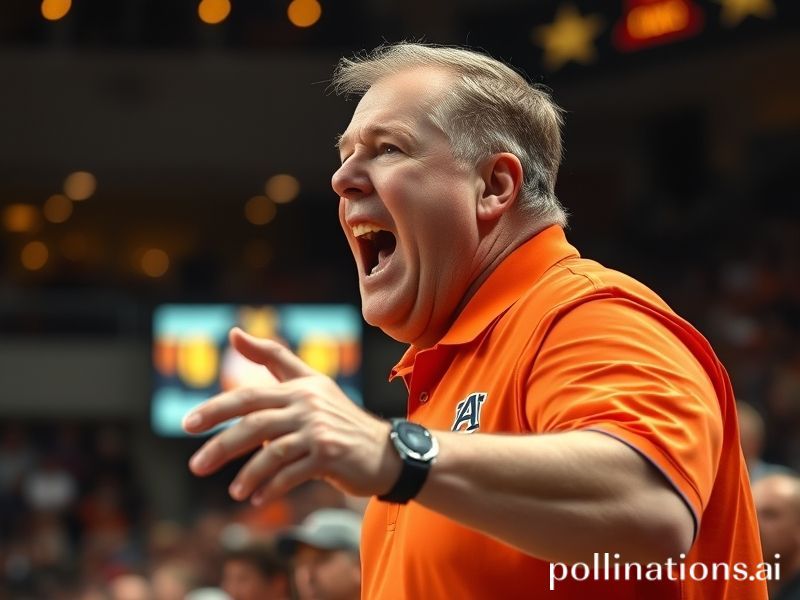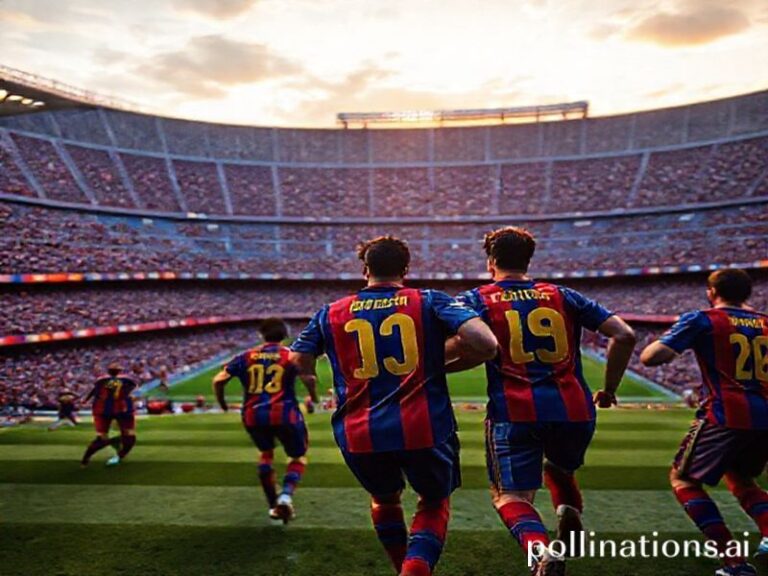Bruce Pearl: The Orange-Blazered Oracle of Our Post-Shame World Order
Bruce Pearl, the human highlighter who moonlights as Auburn University’s basketball coach, has become an unlikely proxy for the global mood disorder we politely call “the 2020s.” Picture it: a man whose wardrobe suggests he lost a bet with a highlighter factory is simultaneously beloved in Alabama and banned from half the polite conference rooms in college sports. If that isn’t a metaphor for the wider world right now, I don’t know what is.
Let’s begin with the ironies that stretch across oceans. In Europe, where football managers are sacked for sneezing the wrong way, Pearl’s rap sheet—lying to NCAA investigators, barbecue-gate, the whole recruiting carnival—would have ended his career somewhere between the antipasto and the tiramisu. Yet here in the United States, a country that still prints “In God We Trust” on money it doesn’t actually back with gold, Pearl is rewarded with raises, private jets, and the kind of job security normally reserved for Supreme Court justices or hereditary monarchs. One continent’s disgrace is another continent’s motivational speaker fee.
Travel east to China, where the government has turned “social credit” into a national sport, and you’ll find officials puzzled by Pearl’s Teflon reputation. In the Middle Kingdom, a single lie on a customs form can strand you at the airport; in the SEC, a fib about a recruit’s visit merely adds color commentary. Somewhere in Beijing, a mid-level apparatchik is drafting a memo titled “How Do We Monetize Shameless Optimism?” and attaching a photo of Bruce in that orange blazer that looks radioactive from satellite imagery.
Down in Latin America—where coaches are occasionally paid in duffel bags and the concept of “amateurism” is funnier than any Netflix special—Pearl’s story plays like telenovela farce. Imagine the narrator: “He was exiled… but he returned, louder and more citrus-hued than ever!” The region understands resurrection narratives; you can’t throw a rock without hitting a politician who’s come back from scandal, coup, or both. Pearl fits right in, except his scandals involve teenagers and brisket rather than generals and embassies.
Even Africa—where grassroots basketball academies are sprouting faster than fintech startups—has skin in this game. Coaches there marvel at the budgets Pearl commands; the annual Auburn recruiting slush fund could vaccinate a mid-sized nation or at least bribe its parliament twice over. Meanwhile, the NCAA clutches its pearls about “amateurism” while the NIL marketplace turns teenage athletes into global microbrands before they can legally rent a car. Somewhere in Lagos, an academy director is Googling “How to Trademark a 16-Year-Old’s TikTok Dance” and sighing.
The broader significance? Bruce Pearl is the living embodiment of our post-truth, post-shame era in sports—and by extension, politics, business, and whatever passes for diplomacy these days. The same week he’s cutting down nets, another coach is being fired for texting impermissible emojis. The arbitrariness isn’t a bug; it’s the feature. The world has decided that entertainment value outranks ethical consistency, and Pearl delivers entertainment the way Vegas delivers regret: loud, neon, and with comped shrimp.
So when the Final Four lights blaze this spring and Bruce’s blazer is visible from the International Space Station, remember: you’re not just watching basketball. You’re watching the global id in action, a continent-sized shrug that says, “Sure, he’s problematic, but have you seen our APR scores?” It’s the same shrug you’ll find in Brussels boardrooms, Riyadh consulates, and Silicon Valley VC pitches. We’ve collectively agreed that if the show is good enough, the receipts can wait. Just don’t ask who’s footing the bill; the answer is probably wearing an Auburn lanyard and wondering why his Venmo keeps crashing.
And that, dear readers, is how a man who once hosted a barbecue so illicit it became case-law ends up as a geopolitical weather vane. Give it another decade and we’ll probably elect him to something. Until then, sit back, enjoy the game, and try not to think too hard about the APR—or the apocalypse.







